Content
- Description of the disease
- Medicines and remedies
- Colchicine
- Allopurinol
- Flexen
- Apo-Sulfinpyrazone
- Probenecid
- Nimesulide
- Video about gout treatment
Gout is a chronic condition the musculoskeletal system of a person, which develops as a result of metabolic disorders. With an exacerbation of this pathology, a sharp deterioration in the general well-being of the patient occurs, there are pronounced signs of acute recurrent arthritis of the joints of the upper and lower extremities. Gout is treated with powerful medications with anti-inflammatory properties.
Description of the disease
Gout is a metabolic disorder in which crystalline substances of sodium monourate - urates - accumulate in the tissues of the patient's body. In a person's blood, the level of uric acid begins to increase, the functional activity of the kidneys decreases to remove this compound from the body.
Clinically, gout is manifested by periodic exacerbations, which are accompanied by inflammation of the bone and connective tissue of the joints, and partial damage to the kidneys. Treatment of this disease is carried out with medications that relieve inflammation in the tissues of the musculoskeletal system.
The following clinical manifestations of gout are distinguished:
- maintaining a high level of uric acid in the blood and urine;
- chronic inflammation in the structure of the joints with periodic exacerbations;
- a state of fever;
- attacks of severe and prolonged pain in the joints of the upper and lower extremities;
- body aches;
- recurrent pyelonephritis;
- general physical weakness;
- nephrosclerosis of kidney tissue with further development of functional failure of this organ.
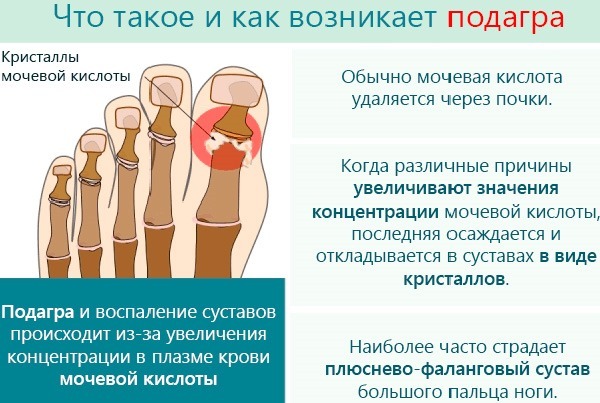
The table below shows the main 4 stages of gout development:
| Stages of gout | Patient status |
| Asymptomatic hyperuricemia | This is the initial stage of development of gout, when a person is in good health. The symptoms of this disease are completely absent. Only a biochemical study of blood and urine can detect high levels of uric acid and other metabolic products. |
| Acute arthritis | Gouty lesion of the structure of the joints is manifested by the progression of the inflammatory process. The entire human musculoskeletal system is located in the affected area. |
| Intercritical period | This stage of the disease is characterized by the chronicity of the pathological process with periodic occurrence of periods of exacerbation. |
| Gouty deposits | One of the last stages of chronic joint damage with uric acid crystals. In the structure of the patient's musculoskeletal system, the accumulation of urates continues, an exacerbation is increasingly manifested illness accompanied by attacks of acute inflammation, fever, dysfunctional disorders from kidneys. |
Treatment of gout with exacerbation with medications begins immediately after an attack of inflammatory damage to the structure of the joints is detected. This pathology is treated by a nephrologist or rheumatologist. The treatment process is carried out in an inpatient department for 10-14 days. This period of time is enough to stop an exacerbation of a gouty attack with the help of drugs.
Medicines and remedies
Therapy for the next exacerbation of gout involves the use of medicines, the pharmacological properties of which are aimed at relieving pain, eliminating the inflammatory process in the joints and reducing the level of uric acid in composition of blood. The type of medicinal product is selected by the doctor based on the results of the patient's examination.
Colchicine
Colchicine is a herbal medicine that is an alkaloid isolated from the tubers of the colchicum plant. This drug is available in the form of white tablets with a slight yellowish tinge. On average, 1 g of Colchicine is dissolved in 25 ml of sterile water for injection.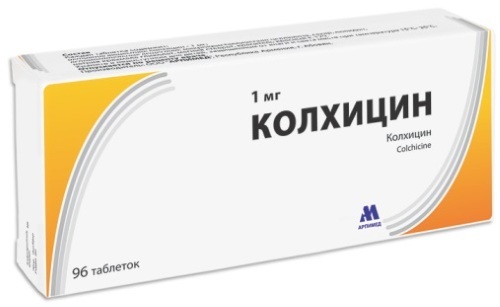
The anti-gout drug Colchicine has the following therapeutic properties:
- relieves inflammation of the tissues of the joints by inhibiting the physiological activity of leukocytes;
- acts as an anesthetic;
- stabilizes the state of the membrane membrane of neutrophil lysosomes;
- prevents the accumulation of uric acid in the tissues of the body.
An indirect pharmacological property of Colchicine is an additional stimulation of the gastrointestinal tract functions and a reduction in the lumen of blood vessels. In this regard, in patients suffering from hypertension, an exacerbation of this disease is possible against the background of an increase in blood pressure. Colchicine is considered one of the most effective medicines with which it is possible to stop the pathological symptoms of the acute phase of a gouty attack.
The drug Colchicine is indicated for use in the following clinical cases:
- an acute attack of gout;
- normalization of the general well-being of the patient in the first 2 years from the start of systemic therapy of hypouricemic drugs;
- prevention of the next exacerbation of gout.
It is believed that the timely use of Colchicine avoids most of the complications associated with an acute gouty attack.
At the same time, taking this medication is contraindicated in the following cases:
- individual intolerance to this drug;
- painful conditions of the mucous membrane and deep tissues of the gastrointestinal tract;
- functional disorders in the work of the kidneys and liver;
- infectious and inflammatory processes in the body, accompanied by suppuration of the affected tissues;
- chronic alcoholism;
- the state of pregnancy and lactation of a newborn baby by breastfeeding;
- severe pathologies of the cardiovascular system;
- any diseases of the bone marrow.
The drug Colchicine is not prescribed for elderly patients, since there is a risk of negative reactions of the body to the pharmacological properties of the active substance.
In the process of stopping an acute attack of gout with the use of the drug Colchicine, the occurrence of side effects of the following nature is not excluded:
- nausea;
- discharge of vomit;
- aplastic anemia;
- partial hair loss (restoration of the scalp occurs within 1-2 months. after stopping therapy with Colchicine);
- increased blood pressure;
- decreased kidney and liver function;
- diarrhea;
- anorexia;
- a state of depression;
- changes in the cellular composition of the blood.
Treatment of gout with exacerbation with medications begins immediately after receiving the results of a biochemical study of the patient's urine and blood. Colchicine is indicated for oral administration.
The following dosage regimen is established with this drug:
- 1st day of acute gouty attack - 1 mg of medication 3 times a day;
- 2nd day of therapy - 1 mg of the drug in the morning and evening;
- 3rd day of treatment 1 mg of medication 2 times a day.
In the following days of relief of an acute gouty attack, the patient takes 1 mg of Colchicine 1 time per day in the evening. The duration of the therapeutic course is determined by the attending physician. The maximum daily dose for this drug is 6 mg. The average cost of the drug Colchicine is 2,400 rubles. for 60 tab.
Allopurinol
The drug Allopurinol is available in the form of white flat-cylindrical tablets. The active component of this drug is the substance allopurinol at a concentration of 300 mg. This medication has a direct effect on metabolic processes in the body associated with the elimination of excess uric acid from the human body.
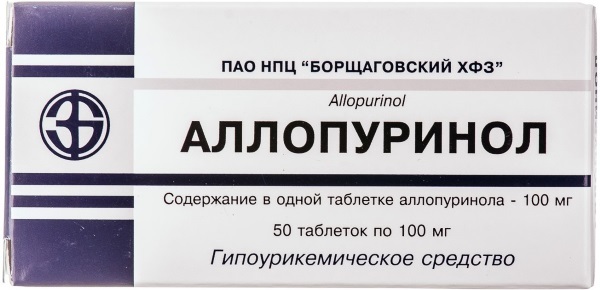
The action of the drug Allopurinol is carried out due to the implementation of its following pharmacological properties:
- disrupts the formation of uric acid molecules;
- acts as a structural analogue of the biochemical substance hypoxanthine;
- inhibits the enzymatic compound xanthine oxidase, which is involved in the synthesis of uric acid;
- helps to reduce the level of urate in the composition of the blood, tissues of the musculoskeletal system and urine;
- removes uric acid from the patient's body, reducing the severity of a gouty attack.
The drug Allopurinol is indicated for admission to patients who have been diagnosed with another exacerbation of gout. This medication can be used as the main means of preventing an increase in uric acid levels.
The dosage regimen of the drug Allopurinol is set individually, depending on the results of a biochemical study of venous blood and urine. On average, patients of the adult age group are prescribed 1-3 tablets per day. The medication is drunk immediately after a meal. The daily dosage for children under 15 years of age is 10-20 mg of the drug per 1 kg of body weight.
The drug Allopurinol for the relief of an acute attack of gout has the following contraindications:
- renal or hepatic impairment;
- the state of pregnancy;
- the tendency to manifest an allergic reaction to the active substance of the medication;
- the period of breastfeeding of a newborn baby.
The main disadvantage of the drug Allopurinol is the high likelihood of developing the following side effects:
- arterial hypertension;
- stomatitis;
- bradycardia;
- hepatitis;
- discharge of vomit;
- nausea;
- thrombocytopenia;
- headache attacks;
- fast fatiguability;
- physical weakness;
- dizziness;
- temporary dysfunctions of the optic nerve;
- change in taste;
- drowsiness;
- skeletal muscle cramps;
- allergic reactions in the form of itching, rashes on the surface of the skin, urticaria.
In rare cases, there are side effects of Allopurinol, when during the course of therapy to stop an acute attack of gout, severe disorders of the endocrine system developed. For example, a patient developed symptoms of gynecomastia, secondary infertility, diabetes mellitus, and sexual dysfunction.
The average cost of the drug Allopurinol in pharmacies is from 98 rubles. for 30 tab.
Flexen
Treatment of gout with exacerbation with medications is performed in continuous courses. Flexen is a drug that comes in the form of soft gelatin capsules, injection solution, and rectal suppositories.
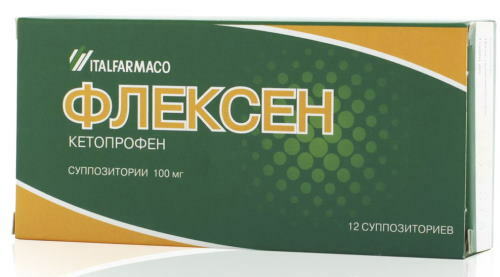
The active component of this agent is ketoprofen at a dosage of 50 mg. Flexen belongs to the pharmacological group of non-steroidal medicines with anti-inflammatory and analgesic properties. This drug is prescribed in the first days of the next exacerbation of gout to quickly stop the attack and ease the general well-being of the patient.
The dosage regimen of Flexen in the form of capsules is determined individually by the attending physician, depending on the age and general condition of the patient. Rectal suppositories of this medication are indicated for use at 100 mg from 1 to 2 times a day. Intravenous or intramuscular administration of Flexen requires compliance with a dosage regimen of 100-200 mg of active substance. The frequency of injections during the day depends on the severity of the gouty attack and the dynamics towards the normalization of the biochemical composition of the patient's blood.
Gout therapy with Flexen is contraindicated in the following cases:
- an allergic reaction to ketoprofen;
- bronchial asthma;
- severe gastrointestinal diseases;
- hepatic or renal impairment;
- polyposis of the paranasal sinuses;
- heart failure;
- the state of pregnancy and lactation of the baby by the breast.
Flexen's active ingredient can affect the level of female fertility. Therefore, patients who have signs of infertility undergo a comprehensive examination of the organs of the reproductive system, it is recommended to temporarily refrain from taking this medication. Flexen is not used to treat patients under 15 years of age. This medication is dispensed only by prescription, and its average cost is from 80 rubles. for 30 capsules.
Apo-Sulfinpyrazone
The drug Apo-Sulfinpyrazone is available in the form of tablets coated with a protective layer. The active substance of this medication is sulfinpyrazone. It is an anti-gout agent that is prescribed as the main or auxiliary drug in the treatment of hyperuricemia to reduce high levels of uric acid. Apo-Sulfinpyrazone has been shown to be effective in treating exacerbations of gout attacks.
This drug is prescribed for oral administration from 100 to 200 mg per day. Apo-Sulfinpyrazone must be drunk with meals. In conditions of long-term therapy of a gouty attack, the therapeutic dose of the drug is adjusted so that the maximum the level of urate in the blood serum was at the level of 6 mg per 100 ml of biological fluid, but not lower than the indicated values.
In the absence of a therapeutic effect on the relief of an acute attack of gout in combination with Apo-Sulfinpyrazone, the patient is prescribed non-steroidal anti-inflammatory drugs and Colchicine.
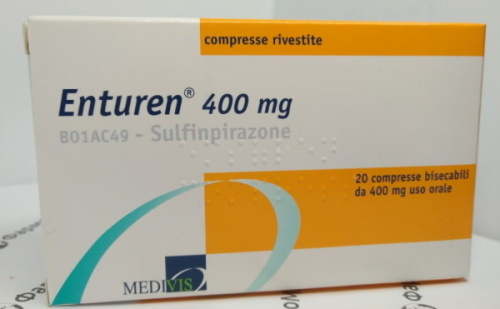
The drug Apo-Sulfinpyrazone has the following contraindications for use:
- hypersensitivity of the body to sulfinpyrazone;
- aspirin asthma;
- renal or hepatic impairment;
- concomitant treatment of oncology with medicines from the group of cytostatics;
- age under 18;
- radiation therapy for malignant tumors;
- the state of pregnancy;
- ulcerative lesion of the mucous membrane of the stomach and intestines;
- breastfeeding a newborn baby;
- hematological diseases and pathologies of the hematopoietic system.
This drug is prescribed with caution to elderly patients, as there is a risk of developing the following side effects:
- red rash on the surface of the skin;
- functional disorders of the kidneys;
- leukopenia;
- increased symptoms of acute gout;
- cramping pain inside the abdomen;
- diarrhea;
- dyspepsia;
- nausea;
- vomit;
- loss of appetite;
- opening of internal bleeding in the digestive tract;
- allergic reactions.
The most dangerous side effect of taking Apo-Sulfinpyrazone is kidney problems. In this case, a deterioration in the general well-being of the patient is possible.
Probenecid
Treatment of gout with exacerbation with medicines is carried out in an inpatient department of nephrology or rheumatology. Probenecid is a tablet drug that is used to relieve gouty attacks, reabsorption of uric acid in the patient's body.
The active substance of this drug is probenecid at a dosage of 500 mg. The mechanism of action of Probenecid is realized by blocking the process of tubular accumulation of urates. Due to this, most of the uric acid, which is concentrated in the blood serum, is excreted through the kidneys from the body along with the urine.
Probenecid is prescribed not only to suppress the next exacerbation of gout, but also for complex treatment inflammatory diseases of the body in combination with antibacterial agents of penicillin and cephalosporin row. Patients with gout take Probenecid 250 mg 2 times a day for 30 days.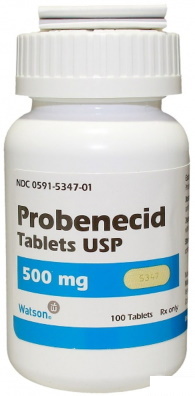
In the absence of a therapeutic effect after 1 week, a single dose of the drug is increased to 500 mg. The maximum daily dosage of the drug Probenecid should not exceed 2 g.
The advantage of using this remedy is that it can be taken within 6 months, preventing the development of another exacerbation of gout.
Probenecid therapy is contraindicated in the following cases:
- tumor neoplasms in the body;
- individual intolerance to the medication;
- the patient's age is under 2 years old;
- porphyria;
- simultaneous treatment of oncological diseases with the use of chemistry preparations;
- secondary hyperuricemia.
Probenecid is used to treat pregnant women, but only when absolutely necessary. The simultaneous administration of this drug with Paracetamol, Indomethacin, Lorazepam increases the concentration of these medicines in the patient's blood plasma. The average cost of Probenecid tablets is 5500 rubles.
Nimesulide
The drug Nimesulide belongs to the pharmacological group of anti-inflammatory nonsteroidal drugs. This medication has anti-inflammatory and analgesic effects.
Nimesulide is indicated for use in patients with signs of gouty rheumatoid arthritis. The maximum therapeutic efficacy of this drug is manifested in the case of its complex administration with Colchicine and other potent anti-gout agents. 1 tablet of Nimesulide contains 100 mg of the active substance of the same name. Also, this drug is available in the form of free-flowing granules, packaged in sachets.
The dosage regimen of Nimesulide is 1 sachet with granules, which are dissolved in 100 ml of water at room temperature. For adults and children aged 12 to 18 years, 1 sachet of this medication is indicated for use 2 times a day.
The prepared solution is used orally after meals. The maximum daily dosage of Nimesulide should not exceed 200 mg. For patients diagnosed with chronic renal failure, it is necessary to reduce the therapeutic dosage of the drug to 100 mg per day.
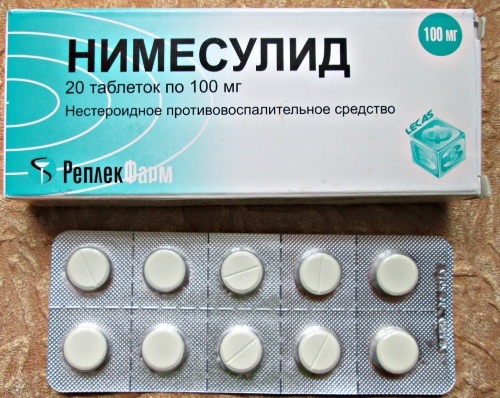
The drug Nimesulide has the following contraindications for use:
- increased sensitivity of the body to nimesulide;
- gastrointestinal diseases;
- cerebrovascular bleeding;
- chronic alcoholism;
- addiction;
- hemophilia;
- inflammatory bowel disease;
- severe pathologies of the kidneys and liver;
- the patient's age is under 12 years old;
- the state of pregnancy and breastfeeding of the baby.
Nimesulide is prescribed with extreme caution to patients who have diabetes mellitus and also suffer from chronic diseases of peripheral arterial vessels. The average cost of this drug is 219 rubles. per pack of 30 sachets.
Gout is a metabolic disorder that develops against the background of a critical increase in the level of uric acid in the patient's blood. This pathology is manifested by periodic attacks of exacerbation of the inflammatory process in the joints. upper and lower extremities, chills, decreased performance and constant physical fatigue.
Treatment of gout by means of drug therapy provides for a course of taking drugs, which interfere with the synthesis of uric acid, and also contribute to a decrease in its concentration in the composition blood.
Video about gout treatment
Acute gout attack. My experience:



